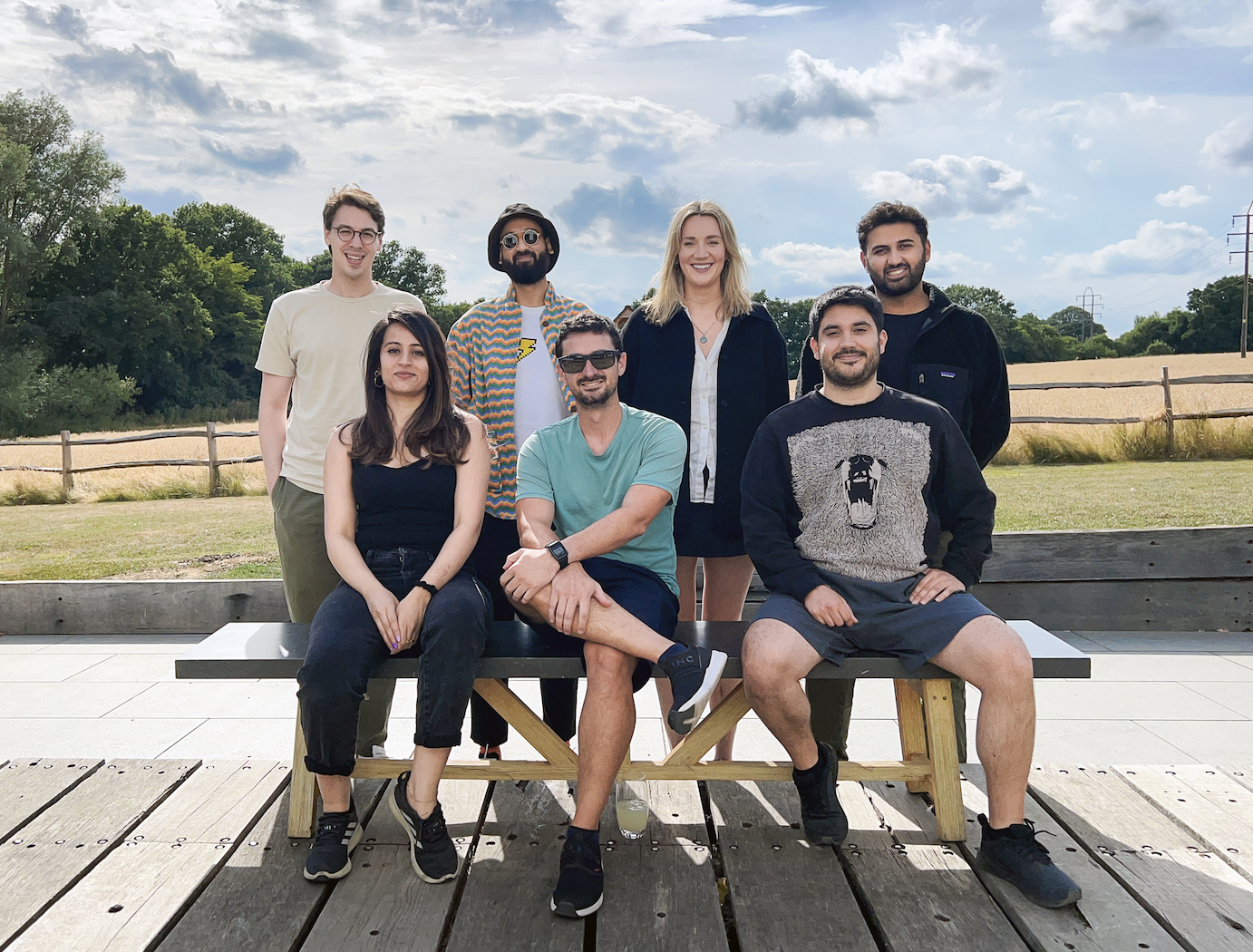Double Scoop: Exciting Updates and Building the machine for data-driven investing
Behind our philosophy is an ambition to strive for technological greatness, and here at Moonfire, we are doing things that no other VC is right now. And we want to lift the hood, starting with our team...

As the weather begins to turn, you are very welcome to warm up and tuck into another edition of the Moonfire monthly newsletter. It's our pleasure to be able to bring you all the latest news and exciting developments from within the Moonfire community, and this month we're jumping into the nuts and bolts of what we do here.
Behind our philosophy is an ambition to strive for technological greatness, and here at Moonfire, we are doing things that no other VC is right now. And we want to lift the hood, starting with our team...
But first, some very exciting news!
Portfolio Updates
Humaans & Lightdash
Humaans & Lightdash: An Exciting Double Scoop
Our philosophy here at Moonfire has always been to identify key sources of disruption, find where they cross with the sectors driving innovation, and then back the breakthrough business at the intersection. So we’re excited to announce that two of portfolio companies, Humaans and Lightdash – both testament to this approach – have just raised new rounds.
Here, we will give you a brief overview of the companies, as well as details of the most recent round, but stay tuned for a more in-depth piece in November.
Humaans

Humaans is reimagining the HR tech stack, bringing best-in-class HR stack solutions together and automating people ops, through which they wish to simplify tasks at the convergence of finance, IT and HR.
In short: It’s HR for the 21st century.
Founders Giovanni Luperti and Karolis Narkevicius were in growth mode from day one of starting the company back in April 2020, and they haven’t let up the pace since then.
Nor has the world let them. The pandemic forced HR teams around the globe to navigate major, lasting shifts in working practice. So in a department that was already under-resourced and lacking effective tools, Humaans was a godsend.
At heart, Humaans is a central hub and single source of truth for employee management, handling everything from onboarding to payroll to process automation. And by connecting up the data, it allows people teams to shape their HR tech stack in the way that works for them, creating a custom platform that can flex and evolve with the business and its people.
Their product has not been in short demand either. With Covid-19 accelerating the uptake in such solutions, Humaans has managed to nab high caliber clients such as Juro, Accurx, Birdie, and many more.
We’re delighted to see them complete their $15m Series A round, led by Stripe alum Lachy Groom, with participation from the likes of Exor, Exponent Founders Capital, Shopify founder Tobias Lütke, Slack founder Stewart Butterfield and Niantic COO Megan Quinn – adding to their already amazing roster of angels, including former LinkedIn CEO Jeff Weiner, Des Traynor from Intercom and Dylan Field from Figma.
As well as continuing to invest in product development and hiring, they now plan to double down on their UK presence and expansion into the broader European market. They’re also focussing on faster data access at scale to better automate the flow of employee data across the tech stack and further supercharge people teams.
Lightdash

Lightdash is building the open-source business intelligence (BI) platform for modern data teams.
As the data stack evolves, and data analysts operate more and more like software developers, existing BI tools are increasingly unfit for purpose, failing to meet the needs of both data analysts and data consumers.
Lightdash turns dbt – a data transformation tool that allows analysts to transform raw data in their warehouse using SQL – projects into a full-stack BI platform.
This means analysts can manage everything as code, defining business logic for metrics and KPIs using developer workflows, while a visual layer allows non-technical users (in the marketing and finance teams, for example) to quickly create their own charts and dashboards. SQL for the experts and an intuitive UI for the rest.
It’s a step-change in the way data teams work: a better way to both build BI and share it with the rest of the business.
And they’ve developed quite the following. Over the last year and a half, the team has built an active community around the free, self-hosted version of its product and a private beta of its fully managed Lightdash Cloud service, counting Accenture, Beauty Pie and Warner Media among its customers.
Now, having closed its $8.4m seed round, Lightdash has just launched the public beta of its core cloud product, with a waitlist of more than 600 companies.
The round was made up of a previously unannounced $2.4m round led by us, with participation from Y Combinator, dbt Labs founder Tristan Handy, Supercell founder Ilkka Paananen and Google’s Bradley Horowitz, and a recent $6m raise in which we welcomed Accel and an all-star group of angels, including Snyk founder Guy Podjarny and Gitlab CMO Ashley Kramer.
Lightdash is also adding new faces to the crew and expanding Lightdash University, an educational programme to help BI teams improve their craft – and a chance for the team to geek out about hard data problems with their community!
Congratulations to both Humaans and Lightdash. We can’t wait to see, and be part of, what’s next.
🌓🔥

Meet Jonas Vetterle
Being a data-driven investor isn’t just something we talk about at Moonfire. It’s also baked into the structure of our team, with the same number of machine learning engineers as traditional investment roles. ‘We’re basically a tech company that does VC, whereas other funds are VC companies that also do tech’ says Jonas Vetterle, one of the four-strong technical core.
Having trained as an economist, he had never envisaged working in investing, or even machine learning. But a consultancy project piqued his interest in the subject, and he embarked on a masters course and career change – bringing him to Moonfire via two start-up roles, including a period at BenevolentAI.
Alongside fellow engineers Francesco and Harpal, and CTO Mike, he dedicates his time to making data-driven investing a reality. ‘VC is traditionally a lot about connections and involves very labour-intensive work,’ he says. ‘When you want to narrow down a list of companies, you can take the traditional approach of having lots of people who go through stuff manually, or you can try to build software that does the same thing.’
Jonas has been integral to developing the data-driven pipeline that is the cornerstone of Moonfire’s approach. ‘Every day we have jobs running in the cloud that look for new data: we have different data sources where we find company descriptions, new companies that were formed and people who started a new company,’ he explains. ‘We’ve got these scrapers and programmes that get data from APIs, and we put all of that into our pipeline - several thousand data points every day.’
Aside from constantly scanning the universe of new companies, the Moonfire Pipeline also works to narrow it down. Moonfire is using ‘the best of both worlds, rule-based where possible, machine learning where necessary’, to screen out companies for a number of reasons such as stage or geography, Jonas explains. ‘If we know a company has already raised Series A it’s easy to screen it out, because we are a pre-seed and seed fund. But often we don’t know anything about a company and have to infer information from their website or description using machine learning.’
Even after screening out start-ups outside Moonfire’s parameters, ‘you still end up with too many companies, and more than you could look at manually,’ Jonas says. The next stage is using natural language processing (NLP) to match how a company describes itself against our own investment thesis in that sector or sub-category. ‘If we come across new companies and have a description of what they do from their website or from one of our sources, we then use cutting-edge language models to calculate how close that company description is to what we think is a winning hand in the future.’ Similarly to companies, the Moonfire Pipeline also evaluates founders, ‘but that is for another blog post,’ Jonas anticipates.
As well as sourcing, screening and evaluating potential investments, the machine learning team also works to enhance the productivity of Moonfire’s investors. ‘We always talk about things we can improve, bottlenecks that we can remove, things we can make more efficient,’ Jonas reflects. Current tools include a browser extension that allows investors reading a company website to access all the additional information that has been gathered on it, and to add it to the pipeline or market map at the touch of a button. He also envisages additional functionality including a tool that will augment investor calls with founders, prompting them with information and questions from the investment thesis material.
These all fit into a vision for investing which harnesses the best of human skills and software capabilities. ‘We’re not trying to automate away people, but we’re trying to make them more efficient at what they’re doing. Humans are very good at certain tasks, like gauging the emotional intelligence of someone on a call. They are maybe not so good at doing screening and tasks that deal with tons of data. We’re trying to take away and automate a lot of the things that are either boring or expensive for humans to do, and free up more of their time to do things that they might do better than machines.’
This work also benefits the founders Moonfire partners with, Jonas suggests. ‘It’s also something our portfolio companies value… when they’re building a technical product, we can tell them that we understand because we’ve done the same thing ourselves. What sets us apart is that we can be a sounding board to them on certain technical questions.’ Among the tools planned for the future is a matching engine that will help portfolio companies to find suitable investors at the seed and Series A stage.
This constantly changing work, in an emerging field, is what makes it an enjoyable challenge. ‘We’re really trying to build something that hasn’t existed before, so it’s new territory,’ Jonas concludes. ‘That’s the best thing about the job.’
Podcast of the Month
All In Podast: Cheating scandals, Twitter updates, rapid AI advancements, Biden's pardon, Section 230 & more
With a lineup that includes Chamath Palihapitiya, Jason Calacanis, David Sacks & David Friedberg, covering all things economic, tech, political, social & poker, you can probably imagine why we like this podcast.
And this episode, in particular, from earlier this month, has everything you could look for - just look at that title.
Whatever your take, well worth listening to.
Good Read of the Month
"Talking to Strangers: What We Should Know about the People We Don't Know" - By Malcolm Gladwell

The routine traffic stop that ends in tragedy. The spy who spends years undetected at the highest levels of the Pentagon. The false conviction of Amanda Knox. Why do we so often get other people wrong? Why is it so hard to detect a lie, read a face or judge a stranger's motives?
Using stories of deceit and fatal errors to cast doubt on our strategies for dealing with the unknown, Malcolm Gladwell takes us on an intellectual adventure into the darker side of human nature, where strangers are never simple and misreading them can have disastrous consequences.
Whatever your taste, we're really excited to dig into this one.
Thank you for tuning in. Not yet subscribed? You can sign up on our brand-new blog page. If you know someone who’d love to read this newsletter, please feel free to share it. We hope you had a wonderful September, and have a great October!
All the best,
Mattias and the Moonfire team
🌓🔥

